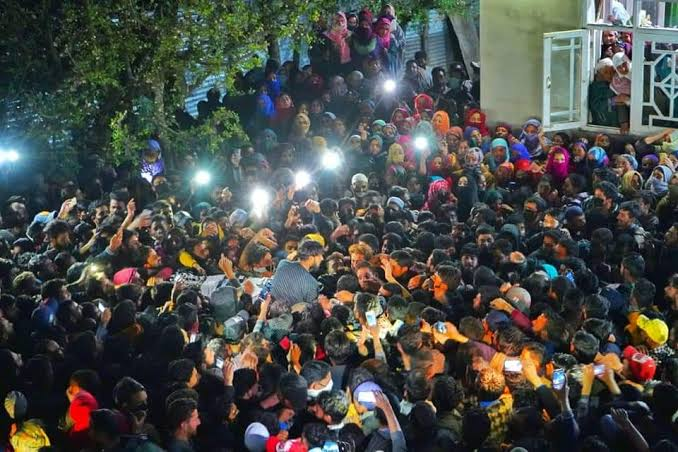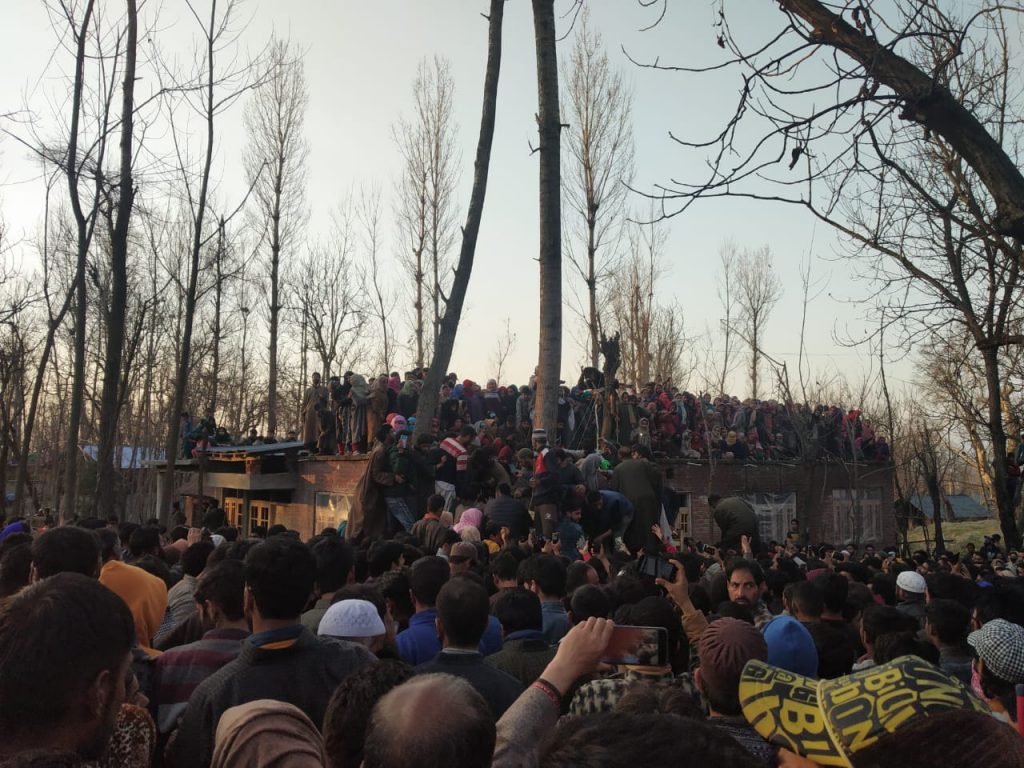
While the world battles coronavirus pandemic, Kashmir has witnessed deadly gunfights between militants and government forces for the last 30 days and intense cross border shelling between India and Pakistan on the de facto Line of Control (LoC). While the calls for a ceasefire by the United Nations Secretary-General were ignored by the government and armed groups, the civil society has endorsed it, Auqib Javeed, TwoCircles.net reports.
Srinagar: On the 17th day of coronavirus lockdown in Kashmir on April 18, an encounter between militants and armed forces in Sopore area of North Kashmir’s Baramulla district left one local militant Sajad Nawab Dar dead.
The funeral of Sajad – who belonged to Saidpora village of Sopore and was with Jaish-e-Mohammad (JeM) militant outfit, saw the participation of hundreds of people chanting pro-freedom and anti-India slogans, a picture of which went viral on social media.
With lockdown orders in place, the Jammu and Kashmir Police swung into action and lodged an FIR against ‘unknown people’ for attending the funeral of the slain militant. Police said those booked had violated government advisories for COVID-19 that barred gatherings.
“Sopore has many dense apple orchards and alternate routes, lanes and by-lanes,” Javid Iqbal, SSP Sopore, told TwoCircles.net. This typical topography, he cited was the reason they couldn’t stop the funeral gathering. More than 400 villagers had attended the funeral and police have arrested at least 50 people till now.
Despite the United Nation Secretary-General appeal on March 23 to all warring parties in all conflicts around the world to “to lay down their weapons in support of the bigger battle against COVID-19,” which has claimed the lives of over 203,809 people so far, in Kashmir the call for a ceasefire hasn’t received any response from either the government or from militant groups.
Since January this year, nearly 50 militants and 13 government personnel have been killed in over 20 gunfights. The number of gunfights since March is higher compared to gunfights in the six months of the shutdown after the government of India scrapped Article 370 of the Indian constitution on August 5, 2019.
Explaining the presence of large gathering at the funeral of a local militant in Sopore even during the lockdown, locals said that the sentiment of freedom is more deep-rooted than the fear of the contracting virus.
For the police – it’s not for the first time that they have been unable to prevent large gatherings at the funeral of militants.
As the Valley grapples with coronavirus pandemic, with positive cases surpassing 500 on Sunday and 7 deaths so far, locals fear the rise in gunfights will increase the risk of contracting the virus due to likelihood of large gatherings at militant’s funerals.
The funerals of militants in Kashmir are usually drawing a huge crowd. “People have risked their lives to give farewell to the slain,” says Tajamul Islam, a PhD scholar from North Kashmir. He adds that since it is time to fight COVID-19 in unison, the government should stop provoking people by declaring a ceasefire.
Mehraj Bhat, a researcher from Srinagar’s downtown area said that the large presence of people at the local militants’ funeral in Sopore is an indication of how people revere those who fight oppression, lockdown or no lockdown. “If they didn’t care about the bullets, why would they care about the virus,” Bhat says.
In the last few years, many incidents were reported in Kashmir where people rushed to encounter sites to save trapped militants and several civilians got killed while doing so.
To contain the spread of the virus, Bhat said mere prohibitory orders wouldn’t stop people from joining funerals if more militants are killed.

Even lodging of FIRs against people won’t stop others from joining, he suggests, adding, “If the government is sincere about saving lives of people from the virus and breaking the chain, encounters should be halted.”
Noted Human Rights activist, Khuram Parvez argues that the government’s guidelines won’t work when it comes to participation of people in militant funerals. “Their calls have been defied in the past when they imposed curfews and even when they killed participants in the funerals,” he says.
Khurram notes that the presence of large gatherings at the funeral of local militants killed in two separate encounters in South Kashmir’s Damhal Hanjipora was also seen on April 5.
On April 17, locals at Dairoo village of Shopian in south Kashmir rushed towards the encounter site to save two trapped militants. The gunfight ended with the killing of the two militants, who were later buried in Sheeri, Baramulla, notwithstanding the claims of the two families from south Kashmir that the slain were their kin.
While the world battles coronavirus, the Valley has witnessed deadly gunfights between militants and government forces since last 20 days and intense cross border shelling between India and Pakistan on de facto Line of Control (LoC).
On April 12, shelling along LoC claimed the life of three civilians in North Kashmir’s Kupwara district.
Speaking with TwoCircles.net, locals expressed helplessness about the possibility of a ceasefire. “Even if we demand the ceasefire, it doesn’t matter for the government who are hell-bent to suppress us since years,” said Abdul Hameed, owner of the house where the Sopore encounter took place. The house was razed to the ground by the forces.
Hameed says it is up to the government to call for a ceasefire amid the growing threat of coronavirus in the Valley.
Political observers in the Valley too, see this as a high time that military operations should be halted in Kashmir. Suhail Ahmad, columnist and political commentator says that all the state and non-state actors should heed the clarion call of UN chief wherein he called for a global ceasefire to focus on “the true fight of our lives.”
“We should rather be united in this fight against COVID-19,” iterates Suhail, reminding that the 2005 Kashmir earthquake saw cooperation between the two sides across the LoC so much so that it came to be known as ‘disaster diplomacy.’ He added that they are facing a bigger disaster right now so it’s high time “we bury the hatchet and help each other in these testing times.”
Khurram says the civil society in Kashmir has always advocated for complete cessation of hostilities between India, Pakistan and Kashmiris not just in the present times.
Former police chief Ali Mohammad Watali told TwoCircles.net that ceasefire should be announced not only in Kashmir but on the LoC as well. “Entire humanity is under trauma and the situation is deteriorating day by day,” he said, adding that the “need of the hour is for the whole world to unitedly fight the pandemic. Other things can wait.”
Additional Spokesperson of the regional party National Conference (NC), Sara Hayat Shah said that NC has been advocating for the ceasefire between the India and Pakistan for many years.
“We (Kashmiris) are the worst sufferers between the hostilities of the two countries and we would be the immediate beneficiaries if there is a ceasefire between them,” she told TwoCircles.net.
In 2018, when PDP-BJP jointly ruled Kashmir, the Government of India had announced suspension of all military operations against militants in Kashmir during the holy month of Ramadan for the first time in nearly two decades.
Former Chief Minister Mehbooba Mufti who was leading the alliance in the erstwhile state had pushed for the ceasefire. In 2000, Hizbul Mujahidin had announced a unilateral ceasefire for three months in Kashmir. The government had then immediately halted military operation but the truce broke down after talks failed.
A top army official, who wished not to be named because he isn’t authorized to speak to media, told TwoCircles.net that “it’s not in their domain to declare a ceasefire.” The official added that the call for a ceasefire must come from the militant’s end.
“Even if we call for a ceasefire, what will be their response?” the official questioned, adding that during the Ramadan ceasefire in 2018, the militants still carried out attacks against security forces. He insisted that the onus lies on militants, saying that “if they (militants) stop their activities, security forces would also stop.
“Thali ek hath se thodi bajti hai (It takes two to clap),” the official said.
